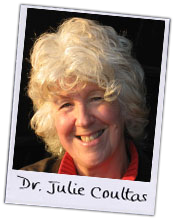By
Dr. Julie Coultas
As children grow and develop they become more adept at interacting and communicating with other people. But when does this communication begin? And what can we do to help young children develop their language skills?
Parents are ‘talking’ with their babies from the day they are born. Eye contact is the first form of communication and by six months babies are learning the art conversation! Have you ever noticed that when babies babble, ‘dadada’, ‘muma,muma’, that we wait for a break in the babbling then often repeat the same sounds back? This is the beginning of conversational turn-taking – baby makes sound, parent is quiet, parent makes sound baby is quiet. Many actions and vocalisations that we make with young children are preparing them for the wider social world to which they need to adapt.
Even before babies use verbal language they communicate through gestures. However it is not until towards the end of the first year that babies use gestural language, for instance pointing, to communicate that they want something. Research on gesture and language in young children has increased recently in parallel with a burgeoning interest by parents in baby sign language classes. But does using gestures with babies influence their language development?
Research shows us that gesture does indeed help with the development of children’s vocabulary. For instance, if toddlers with a limited vocabulary know the word for cat and know the gesture for sleep then they can put the word and gesture together to communicate more than they can say. Once young children begin to string two words together they are communicating what they are thinking. Language development is reinforced when the attentive parent picks up on what the child is trying to communicate and says it back to them e.g. ‘yes the cat is asleep!’. In addition, research has shown that gesturing whilst we speak can help the thought processes of older children and even adults.
A few years ago I was involved in a longitudinal piece of research for VTech where I regularly visited parents and babies in their homes over a period of one year. This was an ideal way to observe differences in development. I would talk with parents about their infants’ play and toys and ask about development e.g. how many words does your toddler know? A little girl who had been taken to baby sign classes had an extensive vocabulary in her second year. One little boy was growing up in a bi-lingual household where he was picking up words in both Spanish and English. One particular VTech toy, which was the focus of the research, featured a programme showing baby signs. During the bi-lingual boy’s second year he managed to learn baby sign language from watching this programme and started to communicate with his parents in a third language! This demonstrates the incredible flexibility of young children’s brains.
Gesture can be the precursor to spoken language. Giving your baby and child every opportunity to interact through gesture and words is important. But one of the most important influences on your child’s language development is making sure that the communication is two-way; parents and caregivers need to show that they understand what their young child is trying to communicate. Research has shown that joint visual attention, looking at the same thing together, is also an important factor in language development. Toys and books can be useful here; if you are both playing with an interesting toy or focussing on a storybook then you know that you are talking about the same thing. Remember, teaching children the subtleties of language is our gift to them; it is all part of our parental investment.

















